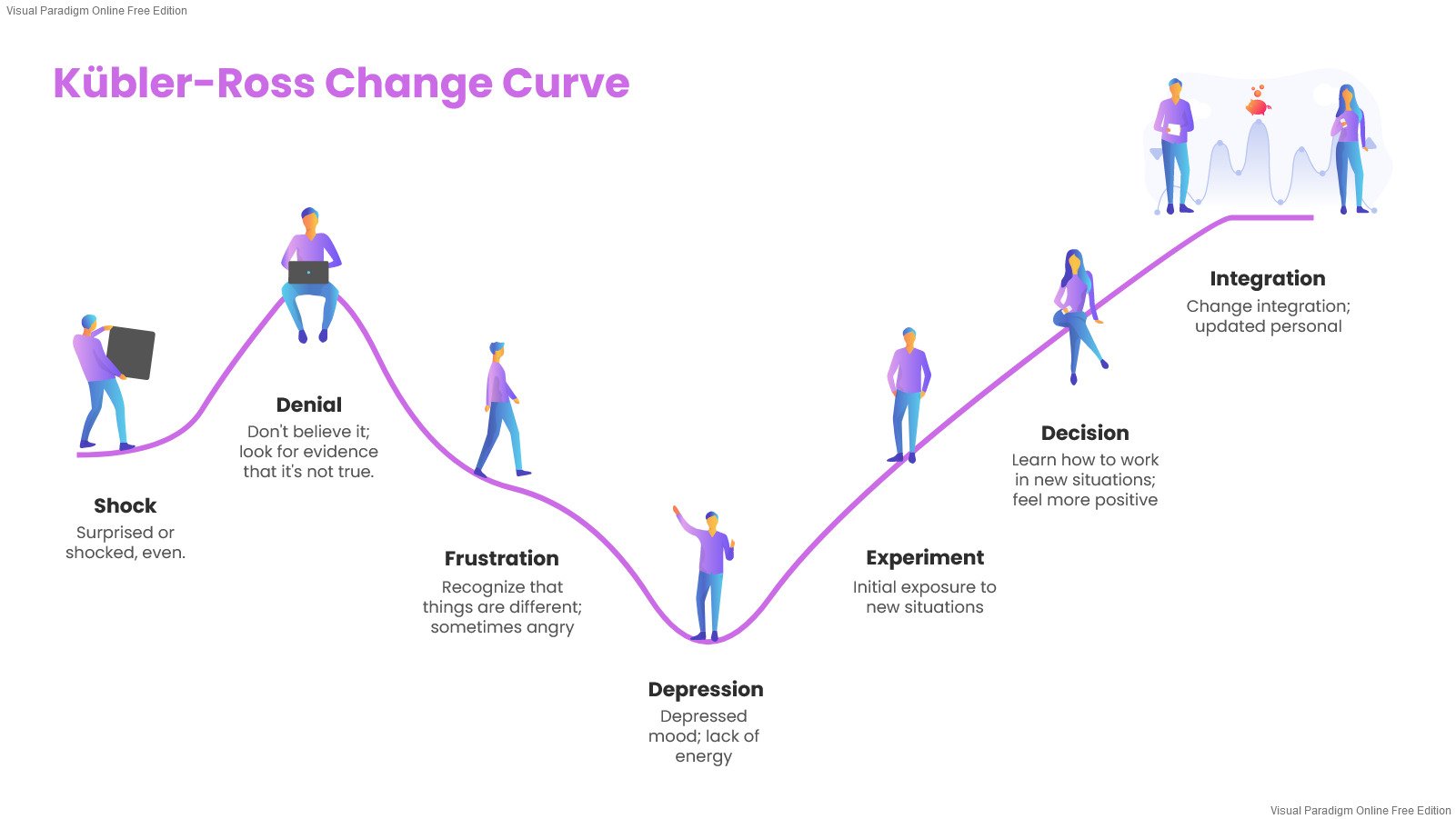Studying abroad is an exciting and life-changing experience, but it also comes with its own set of challenges and uncertainties. As international students venture into unfamiliar territories, they often face cultural, academic, and personal obstacles that can be overwhelming. In such situations, having a framework to understand and cope with these challenges becomes crucial. One such framework is the Kübler-Ross Model, commonly known as the Five Stages of Grief. By applying this model, international students can better navigate the ups and downs of studying abroad and prepare themselves for the uncertain future ahead.
Understanding the Kübler-Ross Model
The Kübler-Ross Model, developed by psychiatrist Elisabeth Kübler-Ross in 1969, originally aimed to explain the stages of grief experienced by individuals facing terminal illness or the death of a loved one. However, its applicability extends beyond grief to various life transitions and challenges. The five stages include denial, anger, bargaining, depression, and acceptance. While not everyone experiences these stages in the same order or with the same intensity, the model provides a framework for understanding the emotional journey of adapting to change.

Figure 1 Elisabeth Kübler-Ross (July 8, 1926 – August 24, 2004)

Denial: Initially, individuals may struggle to accept the reality of the loss. They might deny its occurrence or downplay its significance as a defense mechanism to protect themselves from overwhelming emotions.
Anger: As reality sets in, individuals may experience intense feelings of anger and frustration. They may direct this anger towards themselves, others, or even the situation itself, grappling with a sense of injustice or unfairness.
Bargaining: In this stage, individuals may attempt to negotiate with a higher power or seek ways to regain control over the situation. They may make promises or seek alternative solutions in a desperate attempt to reverse or mitigate the loss.
Depression: As the full weight of the loss sinks in, individuals may experience profound sadness, hopelessness, and despair. This stage often involves a deep sense of mourning and withdrawal as they come to terms with the reality of their situation.
Acceptance: In the final stage, individuals begin to find a sense of peace and resolution. They come to accept the loss as a natural part of life and start to rebuild their identity and sense of purpose, moving forward with renewed strength and resilience.
While the Kübler-Ross Model originated in the context of death and dying, its applications extend far beyond bereavement counseling. In the realm of business, for instance, this model is often used to understand and manage organizational change. When companies undergo significant transitions such as mergers, layoffs, or restructuring, employees may experience a similar emotional journey akin to the stages outlined by Kübler-Ross. Recognizing these stages can help leaders anticipate reactions, provide support, and facilitate smoother transitions.
Kübler-Ross Model in the Context of International Student Adapting New Environment Process
Denial
Initially, international students may experience denial about the challenges they will face while studying abroad. They might downplay cultural differences, academic rigor, or language barriers. To overcome denial, it's essential for students to educate themselves about the host country's culture, academic expectations, and potential difficulties they may encounter.
Anger
As reality sets in, students might feel frustration or anger towards the unfamiliar environment, bureaucratic hurdles, or homesickness.
Channelling this anger into productive outlets such as joining student organizations, seeking support from peers, or practicing mindfulness techniques can help students cope.
Bargaining
In this stage, students may attempt to negotiate with themselves or others to alleviate their discomfort. They might seek shortcuts or compromise their values to adapt more easily.
It's important for students to recognize that adaptation takes time and effort. Instead of bargaining for shortcuts, they should focus on building resilience and seeking support from mentors or counselors.
Depression
Feeling overwhelmed by the challenges of studying abroad is not uncommon. Students may experience homesickness, loneliness, or a sense of inadequacy.
Engaging in self-care activities, maintaining connections with friends and family back home, and seeking professional help if needed are essential steps in managing depression during this transition.
Acceptance
As students gradually adapt to their new environment, they reach a stage of acceptance. They develop a sense of belonging, confidence in their abilities, and a deeper understanding of themselves and the world around them.
Embracing the opportunities for growth and learning, celebrating small victories, and staying open to new experiences are key aspects of reaching acceptance.
Kübler-Ross Model: An Example of International Student Adapting New Environment Process
Let's consider an example of an international student, student X, who has just arrived in a new country to pursue their studies. We'll explore how X might experience and cope with each stage of the Kübler-Ross Model.
Upon arrival, student X might feel excited about the prospect of studying abroad and may overlook potential challenges. They might believe that language barriers won't be a significant issue or that they'll easily adapt to the new culture without much effort. (Denial)
After a few weeks in the new country, X starts experiencing difficulties adjusting to the academic system and encounters communication barriers. Frustration builds up, and he/she becomes increasingly irritable, feeling angry about the challenges they face. (Anger)
In an attempt to cope with their struggles, X considers compromising on their academic goals or values. He/she contemplates finding shortcuts to success, such as relying heavily on translation apps instead of improving language skills through practice. (Bargaining)
As the challenges persist and homesickness sets in, X begins to feel increasingly isolated and hopeless, X withdraws from social activities, experiences difficulty concentrating on studying, and struggles with feelings of sadness and inadequacy. (Depression)
Over time, X begins to adapt to their new environment. He/she establishes a support network of friends, becomes more comfortable with academic expectations, and develops a sense of belonging in their new community. (Acceptance)
In summary, X's example illustrates how the Kübler-Ross Model can be applied to the experiences of international students studying abroad, highlighting the emotional journey and coping mechanisms involved in navigating uncertainty and adapting to a new environment.
Conclusion
Studying abroad is a journey filled with uncertainty, but by applying the Kübler-Ross Model, international students can navigate this transition more effectively. By acknowledging and processing their emotions, seeking support when needed, and staying resilient in the face of challenges, students can make the most of their study abroad experience and prepare themselves for the uncertain future ahead. Remember, adaptation is not just about surviving but thriving in new environments.
About EzyRemit
EzyRemit offers a multitude of benefits for Vietnamese students studying abroad, significantly alleviating their financial burdens. With our user-friendly platform and competitive exchange rates, EzyRemit provides a convenient and cost-effective solution for international money transfers. Vietnamese students can easily send and receive funds for tuition fees, living expenses, and other essential needs without the hassle of traditional banking processes or high transaction fees.
Moreover, EzyRemit's secure and reliable service ensures peace of mind for students and their families, allowing them to focus on their studies and immerse themselves fully in the study abroad experience. By partnering with EzyRemit, Vietnamese students can enjoy seamless financial transactions and greater financial flexibility, empowering them to pursue their academic aspirations with confidence and ease.






